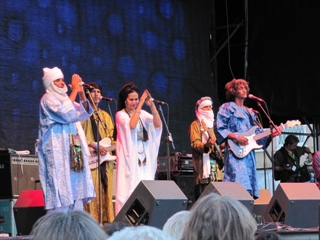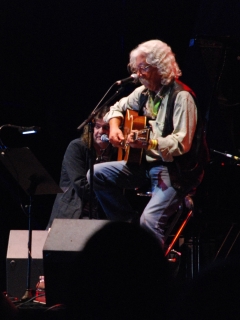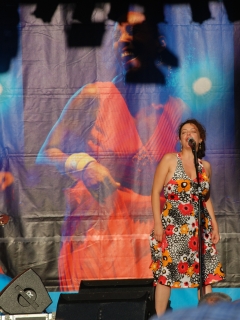
Tinariwen @ FolkWorld:
FW#33,
#35,
#38,
#42
 @ www.myspace.com/tinariwen
@ www.myspace.com/tinariwen
 @ www.youtube.com
@ www.youtube.com
www.tinariwen.com
The Ballad of John Henry:
John Henry is probably the most frequently performed and recorded American folk song
(Josh White devoted an entire LP side to different versions).
The song deals with the digging of the Big Bend Tunnel in West Virginia in the 1870s.
John Henry is notable for having raced against a steam powered
hammer and won - only to die in victory with his hammer in his hand.
|
Some say he's from Georgia,
some say he's from Alabam,
But it's wrote on the rock at the Big Ben Tunnel,
that he's an East Virginia Man.
John Henry was a steel drivin' man,
he died with a hammah in his han',
Oh, come along boys and line the track
for John Henry ain't never comin' back.
John Henry he could hammah,
he could whistle, he could sing,
He went to the mountain early in the mornin'
to hear his hammah ring.
John Henry went to the section boss,
says the section boss what kin you do?
Says I can line a track, I kin histe a jack,
I kin pick and shovel too.
John Henry told the cap'n,
when you go to town,
Buy me a nine pound hammah
an' I'll drive this steel drill down.
Cap'n said to John Henry,
you've got a willin' mind.
But you just well lay yoh hammah down,
you'll nevah beat this drill of mine.
John Henry went to the tunnel
and they put him in lead to drive,
The rock was so tall and John Henry so small
that he laid down his hammah and he cried.
The steam drill was on the right han' side,
John Henry was on the left,
Says before I let this steam drill beat me down,
I'll hammah myself to death.
Oh the cap'n said to John Henry,
I bleeve this mountain's sinkin' in.
John Henry said to the cap'n, Oh my!
tain't nothin' but my hammah suckin' wind.
John Henry had a cute liddle wife,
and her name was Julie Ann,
And she walk down the track and nevah look back,
goin' to see her brave steel drivin' man.
John Henry had a pretty liddle wife,
she come all dressed in blue.
And the last words she said to him,
John Henry I been true to you.
John Henry was on the mountain,
the mountain was so high,
He called to his pretty liddle wife,
said Ah kin almos' touch the sky.
Who gonna shoe yoh pretty liddle feet,
who gonna glove yoh han',
Who gonna kiss yoh rosy cheeks,
an' who gonna be yoh man?
Papa gonna shoe my pretty liddle feet,
Mama gonna glove my han',
Sistah gonna kiss my rosy cheeks,
an' I ain't gonna have no man.
Then John Henry told huh,
don't you weep an' moan,
I got ten thousand dollars in the First National Bank,
I saved it to buy you a home.
John Henry took his liddle boy,
sit him on his knee,
Said that Big Ben Tunnel
gonna be the death of me.
John Henry took that liddle boy,
helt him in the pahm of his han',
And the last words he said to that chile was,
I want you to be a steel drivin' man.
John Henry ast that liddle boy,
now what are you gonna be?
Says if I live and nothin' happen,
a steel drivin' man I'll be.
Then John Henry he did hammah,
he did make his hammah soun',
Says now one more lick fore quittin' time,
an' I'll beat this steam drill down.
The hammah that John Henry swung,
it weighed over nine poun',
He broke a rib in his left han' side,
and his intrels fell on the groun'.
All the women in the West
that heard of John Henry's death,
Stood in the rain, flagged the east bound train,
goin' where John Henry dropped dead.
John Henry's liddle mother
was all dressed in red,
She jumped in bed, covered up her head,
said I didn't know my boy was dead.
They took John Henry to the White House,
and buried him in the san',
And every locomotive come roarin' by,
says there lays that steel drivin' man.
|










